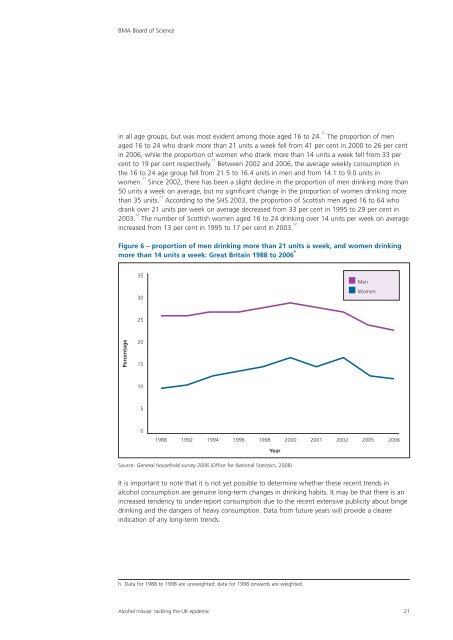Alcohol misuse: tackling the UK epidemic - London
Alcohol misuse: tackling the UK epidemic - London
Alcohol misuse: tackling the UK epidemic - London
You also want an ePaper? Increase the reach of your titles
YUMPU automatically turns print PDFs into web optimized ePapers that Google loves.
BMA Board of Science<br />
in all age groups, but was most evident among those aged 16 to 24. 11<br />
The proportion of men<br />
aged 16 to 24 who drank more than 21 units a week fell from 41 per cent in 2000 to 26 per cent<br />
in 2006, while <strong>the</strong> proportion of women who drank more than 14 units a week fell from 33 per<br />
cent to 19 per cent respectively. 11<br />
Between 2002 and 2006, <strong>the</strong> average weekly consumption in<br />
<strong>the</strong> 16 to 24 age group fell from 21.5 to 16.4 units in men and from 14.1 to 9.0 units in<br />
women. 11<br />
Since 2002, <strong>the</strong>re has been a slight decline in <strong>the</strong> proportion of men drinking more than<br />
50 units a week on average, but no significant change in <strong>the</strong> proportion of women drinking more<br />
than 35 units. 11<br />
According to <strong>the</strong> SHS 2003, <strong>the</strong> proportion of Scottish men aged 16 to 64 who<br />
drank over 21 units per week on average decreased from 33 per cent in 1995 to 29 per cent in<br />
2003. 12<br />
The number of Scottish women aged 16 to 24 drinking over 14 units per week on average<br />
increased from 13 per cent in 1995 to 17 per cent in 2003. 12<br />
Figure 6 – proportion of men drinking more than 21 units a week, and women drinking<br />
more than 14 units a week: Great Britain 1988 to 2006 h<br />
Percentage<br />
35<br />
30<br />
25<br />
20<br />
15<br />
10<br />
5<br />
0<br />
1988 1992 1994 1996 1998 2000 2001 2002 2005 2006<br />
Source: General household survey 2006 (Office for National Statistics, 2008)<br />
It is important to note that it is not yet possible to determine whe<strong>the</strong>r <strong>the</strong>se recent trends in<br />
alcohol consumption are genuine long-term changes in drinking habits. It may be that <strong>the</strong>re is an<br />
increased tendency to under-report consumption due to <strong>the</strong> recent extensive publicity about binge<br />
drinking and <strong>the</strong> dangers of heavy consumption. Data from future years will provide a clearer<br />
indication of any long-term trends.<br />
<strong>Alcohol</strong> <strong>misuse</strong>: <strong>tackling</strong> <strong>the</strong> <strong>UK</strong> <strong>epidemic</strong> 21<br />
Year<br />
h Data for 1988 to 1998 are unweighted; data for 1998 onwards are weighted.<br />
Men<br />
Women
















